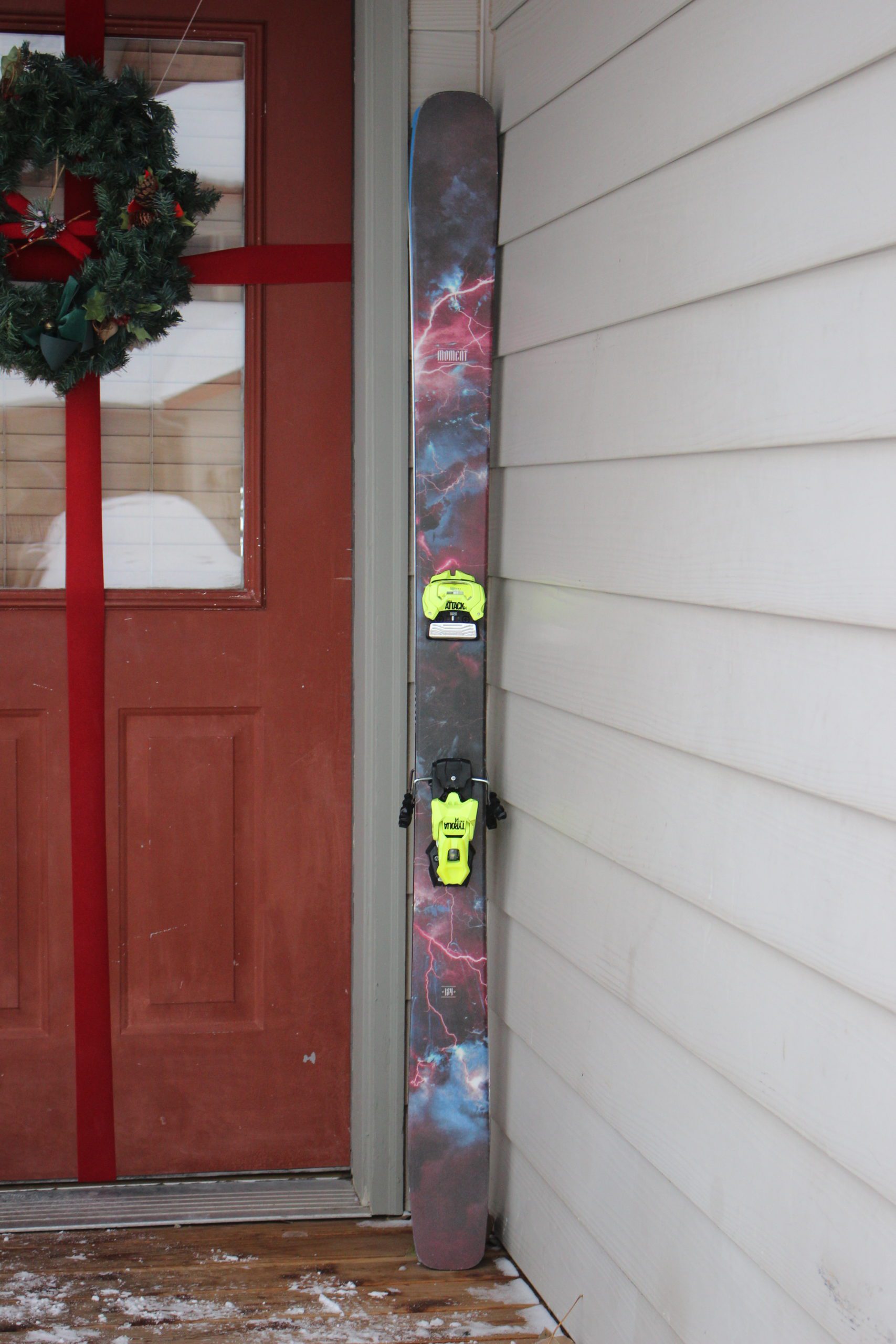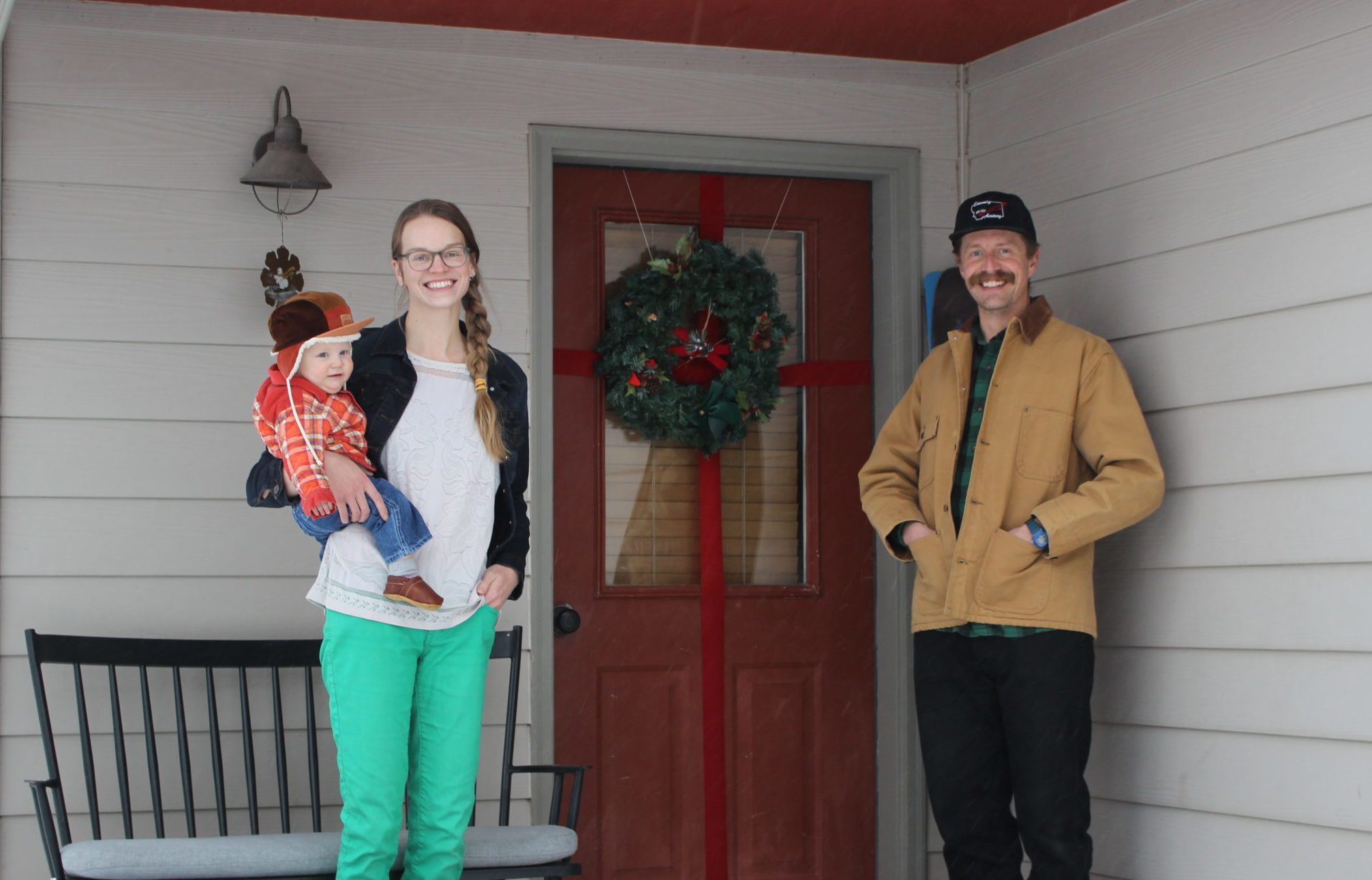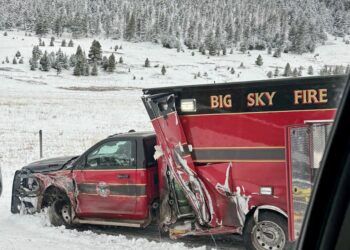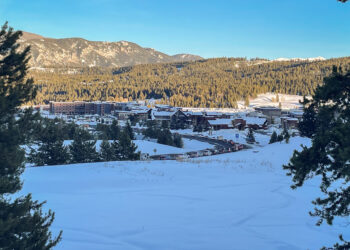Early adopters endorse the program as Big Sky’s housing trust continues to raise money after using annual budget
By Jack Reaney STAFF WRITER
Beth and Jeremy Marlington met in 2009, in what they call a ski school romance. Thanks to “heroes in the community” from the Big Sky Community Housing Trust, their dream of living permanently in Big Sky came true on Nov. 10.
Jeremy Martin moved to Big Sky in 2007 to work as a ski school instructor. He lived in the Whitewater Inn employee housing.
“I only planned to be here for a year or two, but the years kept rolling by,” Jeremy said. The same was true for Beth Billington, who arrived in 2009 and met Jeremy through their work at the resort. Jeremy said they fell in love pretty quick. When they married in 2019, they combined last names into Marlington.
In their 12 years spent as year-round Big Sky community members, Beth said they’ve hopped around between houses, condos and apartments. Usually when a friend mentions where they live, Beth responds, ‘oh yeah, we used to live there.’
They’ve have been kicked out of apartments when landlords decided to pursue profitable short-term rentals, but they still say they’ve generally been lucky and landed on their feet. Many of their friends, on the other hand, have grown tired of renting in Big Sky and moved away.
‘Rapidly running out of room’
Loving their careers and the local community, the Marlingtons have always wanted to buy a home in Big Sky.
“We’ve been kicking ourselves for not buying a place when we moved here in 2009-10,” Beth said. “But we couldn’t afford it then, and it’s gotten more and more expensive ever since; it’s felt out of reach.”
Jeremy has worked for ski school, snowmaking and now ski patrol, and spends summers maintaining trails as field supervisor for a saw crew.

“I’m very blessed in that regard, to get full-time year-round at the resort,” Jeremy said. “I worked very hard for it. I love Lone Mountain, it’s kind of like a cathedral to me. I want it to be the best it can be.”
Beth did ski school and ski patrol before she became a Spanish teacher in the Big Sky School District and high school study abroad instructor.
For the last few years, as assistant head of schools with Big Sky’s Discovery Academy, she’s been fortunate to still teach some Spanish.
“Everything kept getting better in town, including wages and stuff, but the housing market always felt out of reach,” Jeremy added. “We were living in a one-bedroom apartment and leasing, which was fine. But then we decided to have a baby, and when the baby came, we realized our apartment was way too little.”
Baby Silas will celebrate his first birthday in March. He was rather vocal during a phone interview with EBS.
Beth said that in March 2022, “we were rapidly running out of room for all the items this baby requires. We either needed to figure out where to buy [a home] in Big Sky, or we needed to figure out where we were moving to.”
Then, after a few months of frustrating house hunting they heard about the ‘Good Deeds’ program from a couple friends.
‘A chance for long-term locals to get a foot in the door’
“Like, what do you mean they’ll just give us money?” Beth asked. “That sounds crazy!”
Those same friends recommended Tallie Lancey, a local realtor and community organization leader, to help them find a home.
“She made everything possible, really, as far as finding places and making sure we were on it with making an offer. We were totally clueless on how to buy a house,” Jeremy said.
Beth added, “she helped us make it happen in a reasonable way.”
They bought a Madison Court condominium in West Fork, and agreed to place a deed restriction on their home in exchange for a lump sum of cash from the Good Deeds program.
Jeremy’s comforted that if they ever decide to sell, someone in a similar situation will have the chance to buy their place. He said they’re trying to help the housing crisis any way they can.
“And it won’t get snatched up by someone just trying to ‘Airbnb it’ or something,” he said.
For locals in a similar situation—needing to either buy or move away—Jeremy emphasized, “don’t give up hope. There’s still hope.”
He said the first step is a good realtor and the second step is to exercise any option possible, including Good Deeds.
“There’s a chance for long-term locals to get a foot in the door,” Jeremy said.
“Big Sky is not short on resources,” Beth said. “But it’s the distribution [of those resources] that’s not always perfect.”
Beth pointed out that the BSCHT is putting “a pretty good effort” to keep locals around by distributing their budget across a multitude of housing tools including Good Deeds.
“We are so happy to advocate for the program and chat with anybody who’s considering [Good Deeds],” Beth said. “It’s really been life-changing for us.”
“The people at the housing trust are so amazing,” Jeremy said. “They’re absolute heroes in the community, and they deserve to be recognized. They are the bomb.
“I hope money rains down onto the housing trust to get more people involved,” Jeremy added, with regards to the housing trust’s fundraising efforts to replenish their fully-spent budget after its successful pilot year. The housing trust has applied for support from Elevate Big Sky, a philanthropic fund that leverages community foundations and resort tax.
A ‘win-win’ for local businesses
Kristin Kern, owner of the Hungry Moose Market and Deli, sees value in supporting Big Sky’s local workers. That’s why she placed a deed restriction on a condo she was already looking to buy for her employees, using the company budget.
She said BSCHT made the paperwork part simple. She asked for the maximum cash reimbursement, around 20%, and received roughly $50,000 by check when she closed on the property.
“It’s a one-bedroom apartment, and currently rented to a Hungry Moose employee at the mountain. It’s a perfect place for them to start a life in Big Sky,” she said.
“I think any subsidies in a community will help worker populations succeed so the businesses can succeed. We can’t run without workers. They have to want to come here and stay here, and we have to be able to launch them.”
Kern’s spirit is evident; since taking ownership of the Hungry Moose with her husband in 2019, the company has purchased nine condos and provides housing for about 50% of its employees. She says the Hungry Moose staffs 60-70 workers during busy seasons.
“I wish [Good Deeds] was retroactive,” Kern said. “I would [deed restrict] all of my nine condos.”
Speaking to Kern’s wish, BSCHT executive director Dave O’Connor responded that Good Deeds actually is retroactive. Of the seven properties deed restricted in the first year, about half applied to existing properties without requiring any sale. The eligible owner simply received a cash reward in exchange for placing a deed restriction, and nothing else changes until they sell the property.
With the cash Kern earned for placing a deed restriction on the condo, she said she’s going to reinvest and buy another unit for Hungry Moose employees or renovate the units she already owns. She called it a “win-win” for her business.
Kern says O’Connor and BSCHT Program Manager Becky Brockie “are just the smartest people in Big Sky right now. They came up with a brilliant idea… Now the word just needs to get out.”
Like the Marlingtons, Kern learned about Good Deeds through her realtor as she searched to buy another employee housing unit.
O’Connor said that when showing applicable properties, realtors might suggest Good Deeds to help the buyer with their down payment, ultimately enabling the transaction.
“It doesn’t affect commission; the sale price doesn’t change,” he said. “Good Deeds brings money to the table as if it were a down payment assistance plan. I don’t think there’s a downside [for realtors].”
Kern said that a deed reserved in perpetuity for local workers can’t be a bad thing for Big Sky.
“I think anybody in this community who wants to do something really good should consider giving somebody the security of housing,” she said. “I understand people wanting to make money off their investments; that’s one of the reasons they bought a vacation home in a resort town. But they might get to a point where they’re moved to do something good for the overall benefit of the community.”
In late 2022, the Big Sky Community Housing Trust began raising money to enable more Good Deeds opportunities as the program had exhausted its first annual budget in just over six months. Donations can be made through an online portal by clicking here.













